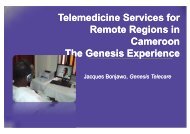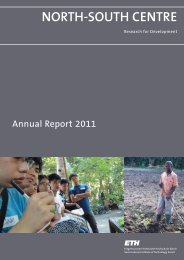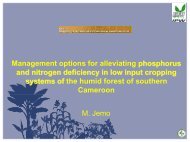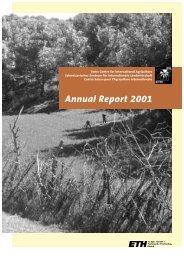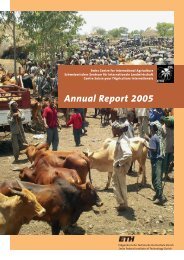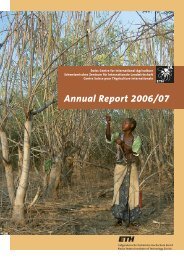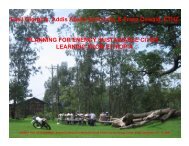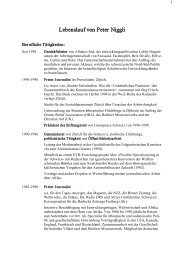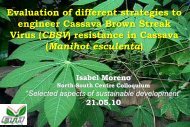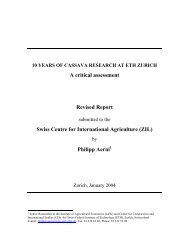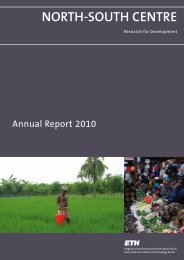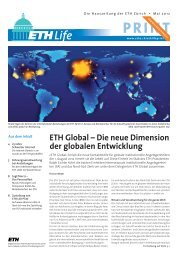NORTH-SOUTH CENTRE - ETH - North-South Centre North-South ...
NORTH-SOUTH CENTRE - ETH - North-South Centre North-South ...
NORTH-SOUTH CENTRE - ETH - North-South Centre North-South ...
Create successful ePaper yourself
Turn your PDF publications into a flip-book with our unique Google optimized e-Paper software.
FOCUS:<br />
Research for development<br />
What are the key characteristics of research for development (R4D)? When is research<br />
relevant for development in the <strong>North</strong>-<strong>South</strong> context? Is the R4D approach compatible<br />
with a scientific career? The concept of R4D is accepted in the development community.<br />
In the university environment, however, the evaluation system needs to be revised<br />
in order to attach academic value to R4D.<br />
At first sight, the niche of the <strong>North</strong>-<strong>South</strong> <strong>Centre</strong> within<br />
the research portfolio of the <strong>ETH</strong> Zurich appears to be geographically<br />
determined, as the terms <strong>North</strong> and <strong>South</strong> suggest.<br />
However, these words are simply meant as a proxy<br />
for describing countries or regions with different economic<br />
conditions. Content-wise, the approach of the <strong>North</strong>-<strong>South</strong><br />
<strong>Centre</strong> can best be defined as “Research for development”<br />
(R4D). The R4D concept has received broad acceptance in<br />
the development community over the last few years. For example,<br />
the British Department for International Development<br />
(DFID) maintains a research portal (www.research4development.info)<br />
with 25 000 project and document records,<br />
including more than 4000 peer-reviewed articles.<br />
Amongst others, Samih Sawiris (Egyptian entrepreneur),<br />
Anton Stadler (Swiss Agency for Development and Cooperation),<br />
and Urs Wiesmann (NCCR <strong>North</strong>-<strong>South</strong>) – representing<br />
the private sector, development cooperation and<br />
science – discussed the interface of research and development<br />
and the necessary conditions for implementing<br />
results. We hope that the following chapters will further<br />
contribute to a constructive debate on this issue.<br />
In this year’s “Focus” section, colleagues of the research<br />
community discuss the R4D concept and its characteristics<br />
from different perspectives. They position R4D in the context<br />
of academic research and the university environment.<br />
They emphasise the interface with development and the<br />
limited role of research agents. All contributions highlight<br />
the complementarity of researchers and other stakeholders,<br />
including their different knowledge systems. They are also<br />
explicit on the appropriate time horizon for R4D. While it<br />
takes time to establish mutually trustful cross-cultural<br />
research partnerships and to generate relevant research<br />
findings, at some point the researchers have to withdraw<br />
and let other stakeholders carry on with the implementation<br />
of the results. It is becoming increasingly apparent that<br />
the implementation of research results needs an enabling<br />
environment to make the “4D” happen, to engender development.<br />
This can only be achieved by functioning institutions<br />
and under conditions of good governance.<br />
The <strong>North</strong>-<strong>South</strong> <strong>Centre</strong> strives for introducing the concept<br />
of R4D in the academic debate at the <strong>ETH</strong> Zurich and in the<br />
wider scientific community. For this purpose, we organised<br />
a <strong>North</strong>-<strong>South</strong> Forum on the topic of how to transfer research<br />
findings into policy and practice in May 2009.<br />
Researchers visiting the project partners, Madagascar<br />
Research for development –<br />
The <strong>North</strong>-<strong>South</strong> <strong>Centre</strong> approach<br />
R4D is characterised as being demand-driven by the<br />
<strong>South</strong>ern partners, of direct relevance for development,<br />
and solution-oriented. The research design calls for<br />
envisioning the potential impact pathways, looking beyond<br />
the immediate research results or outputs such as publications.<br />
R4D integrates various players along the knowledge<br />
generation chain from basic to applied research, and to<br />
implementing agencies and institutions. It is thus transdisciplinary<br />
in nature. The <strong>ETH</strong> Zurich contribution is<br />
usually close to the basic research end of this chain and<br />
involves strategic partners who connect this contribution<br />
to the implementation side.<br />
19<br />
FOCUS<br />
Research for development



